The Mattress and Mattress Component Market is estimated to be valued at USD 81.0 billion in 2025 and is projected to reach USD 129.5 billion by 2035, registering a compound annual growth rate (CAGR) of 4.8% over the forecast period. Growth remains steady across the forecast period, with YoY expansion consistently maintained in the 4.6 to 4.9 percent range. This stable trajectory indicates a mature but resilient industry, supported by recurring replacement cycles, heightened consumer awareness of ergonomic comfort, and the growing popularity of premium and hybrid mattress formats.
Incremental gains become more pronounced over time, increasing from approximately USD 4.1 billion in annual additions in the early forecast years to nearly USD 6.0 billion in annual increments by the later years. Such steady compounding highlights a dependable demand outlook across both developed and emerging economies. Strong retail networks, e-commerce penetration, and enhanced product differentiation are expected to play a decisive role in sustaining this pace. The sector demonstrates predictable, long-term growth momentum.
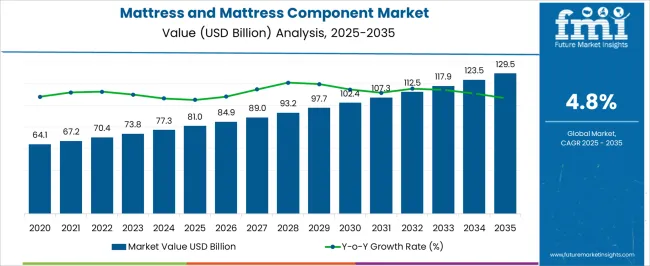
| Metric | Value |
|---|---|
| Mattress and Mattress Component Market Estimated Value in (2025 E) | USD 81.0 billion |
| Mattress and Mattress Component Market Forecast Value in (2035 F) | USD 129.5 billion |
| Forecast CAGR (2025 to 2035) | 4.8% |
The mattress and mattress component market is growing steadily due to increasing consumer demand for comfort and improved sleep quality. Changes in lifestyle, rising disposable incomes, and growing awareness about the importance of sleep have driven consumers to invest in premium bedding solutions.
Product innovations such as enhanced foam materials and ergonomic designs have attracted attention across all age groups. Retail expansions and e-commerce channels have increased accessibility, while urbanization has led to higher demand for larger mattresses.
Health trends emphasizing spinal support and pressure relief have further encouraged the adoption of advanced mattress technologies. Moving forward, the market is expected to expand with continued innovations in materials and the rising popularity of king-size mattresses among consumers seeking spacious sleep environments. Segmental growth is expected to be led by foam mattresses as a preferred product type, foam components for their durability and comfort, and king-size mattresses as a favored size option.
The mattress and mattress component market is segmented by product type, component type, size, price range, end-use, distribution channel, and geographic regions. By product type, the mattress and mattress component market is divided into Foam mattresses, Hybrid mattresses, Innerspring mattresses, Latex mattresses, and Others (waterbeds, airbeds, etc.). In terms of component type, the mattress and mattress component market is classified into Foam, Innerspring, Latex, Fillings, and Others (such as ticking). Based on size, the mattress and mattress component market is segmented into King size, Single size, Twin size, Full or double size, and Others. By price range of the mattress and mattress component market is segmented into Mid, Low, and High. By end use of the mattress and mattress component market is segmented into Residential and Commercial. By distribution channel of the mattress and mattress component market is segmented into Offline and Online. Regionally, the mattress and mattress component industry is classified into North America, Latin America, Western Europe, Eastern Europe, Balkan & Baltic Countries, Russia & Belarus, Central Asia, East Asia, South Asia & Pacific, and the Middle East & Africa.
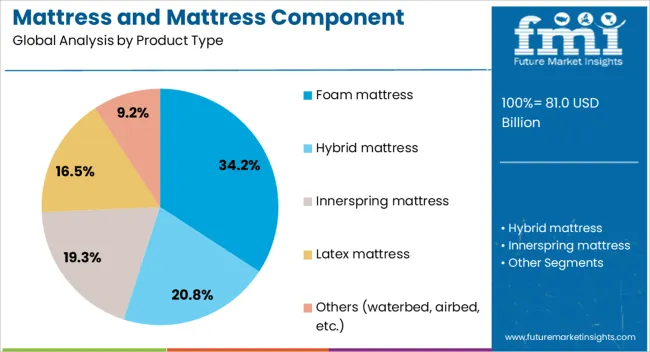
The foam mattress segment is projected to contribute 34.2% of the mattress and mattress component market revenue in 2025, leading the product category. This segment has grown as consumers increasingly prioritize mattresses that provide pressure relief and conform to body contours.
Foam mattresses offer superior comfort and support compared to traditional spring mattresses and are widely favored for their ability to reduce motion transfer and improve sleep quality. Advancements in foam technology have led to the development of memory foam and gel-infused varieties that regulate temperature and enhance durability.
The rising preference for hypoallergenic and dust mite-resistant bedding has also supported foam mattress adoption. With continued product innovation and consumer focus on sleep wellness, the foam mattress segment is expected to sustain its market dominance.
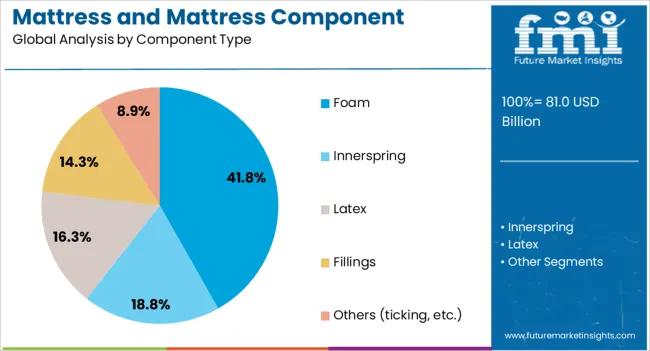
The foam component segment is anticipated to hold 41.8% of the mattress component market revenue in 2025, maintaining its position as the leading material type. Foam is valued for its lightweight nature, resilience, and versatility, making it a critical component in modern mattresses.
Manufacturers have leveraged foam’s cushioning properties to enhance comfort and support across a range of mattress designs. The increasing demand for eco-friendly and CertiPUR-US certified foams has driven innovation in sustainable material sourcing.
Additionally, foam components allow for customization in firmness and density, enabling tailored sleep solutions. Growing consumer preference for comfort and durability has made foam the material of choice in mattress construction, ensuring this segment's continued growth.
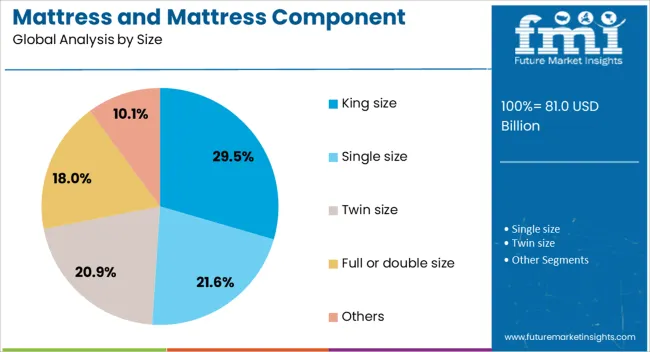
The king size mattress segment is projected to account for 29.5% of the market revenue in 2025, making it the preferred mattress size. The popularity of king size mattresses has been boosted by increasing consumer demand for spacious and comfortable sleeping areas.
Larger bedrooms and a shift toward premium bedroom furniture have supported the adoption of king size beds. Couples and families with children or pets often prefer king size mattresses for additional space and comfort.
Retailers have expanded their product offerings and marketing campaigns to promote larger mattress sizes as a lifestyle choice. As consumer interest in sleep quality and bedroom aesthetics grows, the king size mattress segment is expected to maintain its strong market presence.
The mattress and mattress component market is being shaped by premium comfort preferences, digital sales growth, material innovation, and health-driven demand. These factors together are accelerating product diversification and widening consumer adoption globally.
The mattress and mattress component industry has been shaped by a notable rise in consumer focus on sleep quality. Premium and orthopedic mattresses are gaining wider acceptance, particularly as awareness of posture-related health issues increases. Hybrid designs combining foam, springs, and latex are preferred for their tailored comfort, leading to a gradual shift from traditional models. Hospitality projects and luxury housing developments also contribute to this trend, driving bulk purchases and upgrades. With the growth of online reviews and greater access to product information, buyers are showing a stronger inclination toward premium options. Manufacturers are responding by expanding product ranges with multi-layered constructions and breathable materials that provide both comfort and durability.
E-commerce has emerged as a critical distribution channel for mattresses and components, creating significant opportunities for brands to reach consumers directly. The bed-in-a-box model has reshaped buyer behavior, offering convenient delivery and competitive pricing. Online platforms allow consumers to compare features, reviews, and warranties before purchasing, shifting preference away from traditional retail showrooms. Subscription-based models for mattress replacement and accessory add-ons have also begun to gain traction. Digital marketing and social media campaigns have further improved brand visibility, creating engagement across age groups. As a result, smaller brands are competing with established players, intensifying price competition and expanding consumer choice. Direct-to-consumer strategies remain central to market expansion.
Continuous evolution in mattress components has fueled stronger differentiation among products. Advanced foam varieties, cooling gel layers, and ergonomic spring systems have been widely incorporated to meet diverse consumer needs. Latex blends are becoming popular due to their durability and comfort, while adjustable bases integrated with mattresses offer flexibility for personalized use. Material efficiency is also improving through modular component designs that reduce waste and streamline production. Such developments are influencing both mass-market and premium categories, creating broader adoption. These innovations also improve the overall replacement cycle, as consumers seek products with enhanced performance and longevity. Manufacturers are investing heavily in product R&D to strengthen market positioning.
Growing consumer awareness of health-related issues linked to poor sleep has become a key factor boosting the mattress and component market. Orthopedic and posture-supporting products are marketed strongly toward aging populations, while allergy-resistant fabrics appeal to younger households. Sleep-tracking devices and integration of wellness-focused features are driving consumers toward advanced models. Healthcare providers are increasingly recommending specialized mattresses to patients with back pain or sleep disorders, further validating demand. Lifestyle shifts have reinforced the need for sleep products as an integral part of overall well-being, encouraging premium spending. The emphasis on restorative rest has made mattresses not just a necessity but also a wellness-driven purchase across demographics.
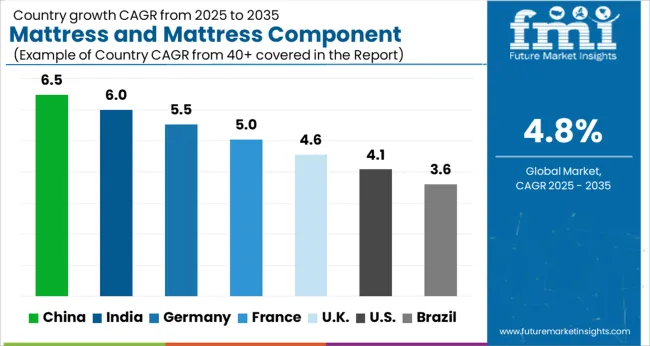
The mattress and mattress component market is projected to grow at a global CAGR of 4.8% between 2025 and 2035, supported by rising consumer focus on sleep wellness, premiumization of bedding products, and expansion of online and offline retail platforms. China leads with a CAGR of 6.5%, driven by rapid housing development, strong domestic manufacturing, and a shift toward hybrid and orthopedic mattresses. India follows at 6.0%, fueled by growing middle-class expenditure, expansion of branded mattress outlets, and increasing consumer awareness of posture support. France posts 5.0%, influenced by heightened preference for luxury sleep products, hospitality sector investments, and consumer orientation toward wellness-driven designs. The United Kingdom achieves 4.6%, supported by strong e-commerce penetration, bulk orders from hotels, and evolving consumer preference for compact comfort-focused options, while the United States posts 4.1%, shaped by steady replacement cycles, high competition among established brands, and the maturity of the bedding retail landscape. This analysis underlines how these leading countries are defining benchmarks in product innovation, retail transformation, and health-driven demand patterns that will shape the long-term trajectory of the global mattress and mattress component industry.
The China mattress and mattress component market expanded at a CAGR of around 5.7% between 2020 and 2024, supported by fast-growing residential construction and a steady rise in domestic furniture exports. From 2025 to 2035, the CAGR improves to 6.5%, as wellness-driven bedding adoption, luxury hybrid mattresses, and retail channel expansion strengthen industry momentum. The sharper pace during the second period is linked to competitive domestic production, rising disposable household budgets, and stronger integration of smart bedding features. Local producers are capturing value by introducing modular sleep systems and improving global exports to Southeast Asian and European markets.
In India, the mattress and mattress component market grew at a CAGR of nearly 5.3% during 2020-2024, aided by lifestyle upgrades in urban households and affordable product expansion in semi-urban clusters. The CAGR climbs to 6.0% in 2025-2035 as branded players dominate distribution, organized retail penetration deepens, and demand for orthopedic and memory foam solutions gains traction. This upward momentum is underpinned by a broader middle-class income rise and marketing efforts focused on health-centric sleep solutions. Domestic and global brands are targeting tier-2 and tier-3 cities with affordable comfort-oriented products to scale their overall market penetration.
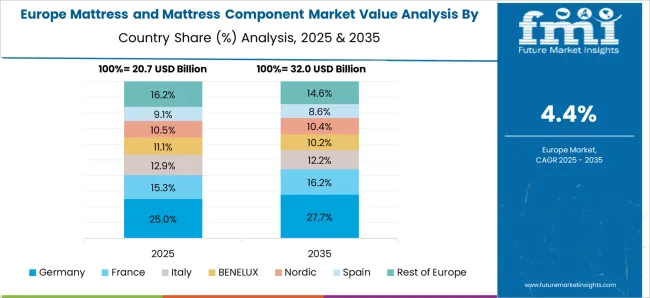
France recorded an estimated CAGR of 4.6% between 2020 and 2024, benefiting from replacement cycles, product diversification, and hospitality-linked bedding purchases. By 2025-2035, the CAGR advances to 5.0% as luxury sleep products, eco-certified materials, and modular bedding formats see greater adoption. The rise in pace is linked to strong health and posture-related consumer awareness, growing boutique mattress brands, and rising demand from hotel renovation projects across major cities. The French consumer preference for artisan and luxury bedding products continues to differentiate this market compared to mass-market dominated countries.
Between 2020 and 2024, the UK mattress and mattress component market registered a CAGR of around 3.7%, supported by replacement demand in established households and modest innovation in compact bedding solutions. The CAGR improves to 4.6% in 2025-2035, higher than the earlier phase, reflecting stronger e-commerce penetration, bulk hospitality orders, and a shift toward hybrid and ergonomic designs. The acceleration is tied to deeper online retailing integration and consumer inclination toward compact, space-efficient products in urban dwellings. This change demonstrates how a matured market gradually shifts toward wellness-focused purchases and customized comfort solutions.
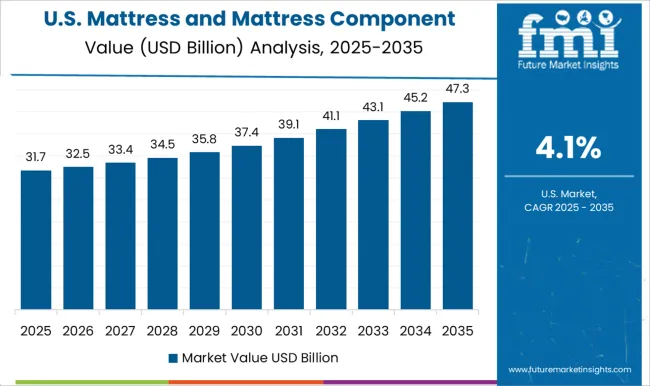
The United States market for mattresses and mattress components posted a CAGR of 3.5% from 2020 to 2024, influenced by intense brand competition, steady replacement cycles, and mature retail infrastructure. From 2025 to 2035, the CAGR edges up to 4.1% as product differentiation strategies, premium memory foam expansion, and direct-to-consumer sales channels reinforce growth. The faster pace is attributed to digital-first retailing, higher disposable incomes in major states, and adoption of specialized mattresses targeting back care and wellness niches. Leading brands have leveraged nationwide logistics capabilities to cater to fast delivery demand across both premium and mid-range bedding segments.
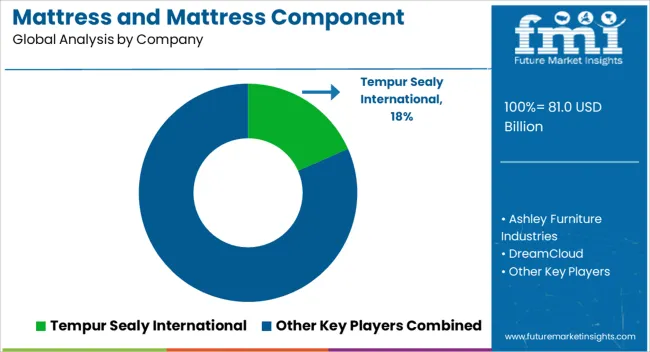
Tempur Sealy International remains a dominant player with extensive product lines, premium positioning, and global retail partnerships. Ashley Furniture Industries leverages its wide retail network and brand recognition to capture significant sales across mid-range categories. DreamCloud and Helix Sleep focus on direct-to-consumer online models, offering hybrid and memory foam solutions targeted at younger demographics. Hästens maintains a luxury niche with handcrafted products emphasizing craftsmanship and exclusivity. IKEA captures mass-market buyers through cost-efficient mattresses and bundled furniture offerings, while Kingsdown emphasizes craftsmanship and comfort in both domestic and export markets.
Leggett & Platt plays a crucial role as a leading supplier of mattress components, influencing industry supply chains. Purple Innovation differentiates with gel grid technology, while Relyon is recognized for heritage-driven craftsmanship in the UK. Saatva gains momentum in the premium online mattress space by emphasizing customer-centric delivery models. Serta Simmons Bedding and its subsidiary Simmons Bedding Company hold substantial market shares in North America with multi-brand strategies targeting varied income groups. Sleep Number Corporation strengthens its leadership in adjustable smart beds, integrating personalization and technology for long-term retention. Stearns & Foster enhances its competitive positioning within the luxury segment under Tempur Sealy’s portfolio. Competitive strategies revolve around diversifying product lines, strengthening online and offline distribution, advancing ergonomic and health-oriented features, and engaging in mergers, licensing, and retail collaborations. Market players aim to balance affordability, customization, and premiumization to address diverse consumer needs across global regions.
| Item | Value |
|---|---|
| Quantitative Units | USD 81.0 Billion |
| Product Type | Foam mattress, Hybrid mattress, Innerspring mattress, Latex mattress, and Others (waterbed, airbed, etc.) |
| Component Type | Foam, Innerspring, Latex, Fillings, and Others (ticking, etc.) |
| Size | King size, Single size, Twin size, Full or double size, and Others |
| Price Range | Mid, Low, and High |
| End Use | Residential and Commercial |
| Distribution Channel | Offline and Online |
| Regions Covered | North America, Europe, Asia-Pacific, Latin America, Middle East & Africa |
| Country Covered | United States, Canada, Germany, France, United Kingdom, China, Japan, India, Brazil, South Africa |
| Key Companies Profiled | Tempur Sealy International, Ashley Furniture Industries, DreamCloud, Hästens, Helix Sleep, IKEA, Kingsdown, Leggett & Platt, Purple Innovation, Relyon, Saatva, Serta Simmons Bedding, Simmons Bedding Company, Sleep Number Corporation, and Stearns & Foster |
| Additional Attributes | Dollar sales, share by product type, material preference, regional demand outlook, distribution shifts, consumer comfort trends, competitive positioning, and pricing strategies for premium and value segments. |
The global mattress and mattress component market is estimated to be valued at USD 81.0 billion in 2025.
The market size for the mattress and mattress component market is projected to reach USD 129.5 billion by 2035.
The mattress and mattress component market is expected to grow at a 4.8% CAGR between 2025 and 2035.
The key product types in mattress and mattress component market are foam mattress, hybrid mattress, innerspring mattress, latex mattress and others (waterbed, airbed, etc.).
In terms of component type, foam segment to command 41.8% share in the mattress and mattress component market in 2025.






Our Research Products

The "Full Research Suite" delivers actionable market intel, deep dives on markets or technologies, so clients act faster, cut risk, and unlock growth.

The Leaderboard benchmarks and ranks top vendors, classifying them as Established Leaders, Leading Challengers, or Disruptors & Challengers.

Locates where complements amplify value and substitutes erode it, forecasting net impact by horizon

We deliver granular, decision-grade intel: market sizing, 5-year forecasts, pricing, adoption, usage, revenue, and operational KPIs—plus competitor tracking, regulation, and value chains—across 60 countries broadly.

Spot the shifts before they hit your P&L. We track inflection points, adoption curves, pricing moves, and ecosystem plays to show where demand is heading, why it is changing, and what to do next across high-growth markets and disruptive tech

Real-time reads of user behavior. We track shifting priorities, perceptions of today’s and next-gen services, and provider experience, then pace how fast tech moves from trial to adoption, blending buyer, consumer, and channel inputs with social signals (#WhySwitch, #UX).

Partner with our analyst team to build a custom report designed around your business priorities. From analysing market trends to assessing competitors or crafting bespoke datasets, we tailor insights to your needs.
Supplier Intelligence
Discovery & Profiling
Capacity & Footprint
Performance & Risk
Compliance & Governance
Commercial Readiness
Who Supplies Whom
Scorecards & Shortlists
Playbooks & Docs
Category Intelligence
Definition & Scope
Demand & Use Cases
Cost Drivers
Market Structure
Supply Chain Map
Trade & Policy
Operating Norms
Deliverables
Buyer Intelligence
Account Basics
Spend & Scope
Procurement Model
Vendor Requirements
Terms & Policies
Entry Strategy
Pain Points & Triggers
Outputs
Pricing Analysis
Benchmarks
Trends
Should-Cost
Indexation
Landed Cost
Commercial Terms
Deliverables
Brand Analysis
Positioning & Value Prop
Share & Presence
Customer Evidence
Go-to-Market
Digital & Reputation
Compliance & Trust
KPIs & Gaps
Outputs
Full Research Suite comprises of:
Market outlook & trends analysis
Interviews & case studies
Strategic recommendations
Vendor profiles & capabilities analysis
5-year forecasts
8 regions and 60+ country-level data splits
Market segment data splits
12 months of continuous data updates
DELIVERED AS:
PDF EXCEL ONLINE
Mattress Topper Market Size and Share Forecast Outlook 2025 to 2035
Mattress And Furniture Bags Market Size and Share Forecast Outlook 2025 to 2035
Mattresses & Accessories Market Analysis - Size, Share, and Forecast Outlook 2025 to 2035
Mattress Pads Market Analysis - Size, Share, and Forecast Outlook 2025 to 2035
Market Share Breakdown of Mattress and Furniture Bags
Air Mattress Market Insights – Growth & Forecast 2019 to 2029
Smart Mattress Market Size and Share Forecast Outlook 2025 to 2035
Latex Mattress Market Growth & Forecast 2025-2035
Queen Mattress Market
Luxury Mattress Market Size and Share Forecast Outlook 2025 to 2035
Heated Mattress Pads Market
Children Mattress Market Product Type, Ingredient Type, Sales Channel, and Region - Trends, Growth & Forecast 2025 to 2035
Hospitality Mattress Market Size and Share Forecast Outlook 2025 to 2035
Innerspring Mattresses Market Analysis - Size, Share, and Forecast Outlook 2025 to 2035
Smart Medical Mattress Market Size and Share Forecast Outlook 2025 to 2035
Down Alternative Mattresses Market Size and Share Forecast Outlook 2025 to 2035
Emergency Transfer Vacuum Mattress Market Size and Share Forecast Outlook 2025 to 2035
Medical Anti-Decubitus Air Mattress Market Size and Share Forecast Outlook 2025 to 2035
Component Content Management Systems Market Size and Share Forecast Outlook 2025 to 2035
Laser Component Analyzer Market Size and Share Forecast Outlook 2025 to 2035

Thank you!
You will receive an email from our Business Development Manager. Please be sure to check your SPAM/JUNK folder too.
Chat With
MaRIA